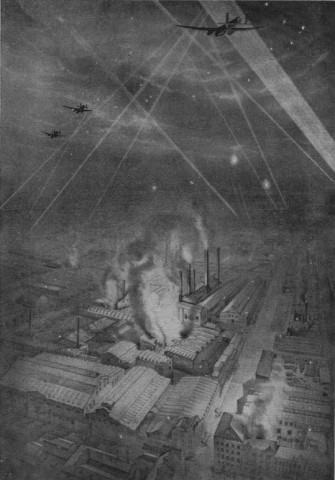Last month I touched on the Hidden Hand, an alleged German conspiracy during the First World War, supposedly undermining the British war effort from within. Unfortunately (or perhaps fortunately!) my sources don’t include some of the more extreme publications pushing this conspiracy theory, but I have looked at the Daily Mail, which has published the occasional intemperate article over the years. Here are some examples of Germanophobic scaremongering from the summer of 1917.
On 13 June 1917, London was hit by the worst air raid of the war. 162 people were killed and 432 wounded when a handful of Gotha bombers attacked the city in broad daylight. There was no warning and little sign of any air defences, which was a bit of a shock given that London’s first air raid took place more than two years earlier. Naturally people were angry, and looked for somebody to blame. On 21 June, the City of London’s Common Council met (following a deputation to the Home Secretary) to discuss what should be done in response, or rather what they should request the government to do in response. One idea was to give warnings to the public when enemy aircraft approached London, so that they could take cover. Another was to intensively bomb German cities in reprisal. But the proposal to which the Daily Mail devoted the most space was that enemy aliens should be interned.
Cuthbert Wilkinson, one of the councillors, seemed to have the most to say. He brandished a letter before his peers, the contents of which would ‘simply astonish you all’ if he were to read them out; the government had been informed but was unable to act because of ‘the difficulty of absolute substantiation’. But
There are dozens and dozens of cases of enemy aliens working, and no doubt plotting, among us. If we could only get one out of every dozen it would be something, but apparently we can’t! And they laugh at us!
For example, he mentioned a large London hotel, which
was managed and run by men who once were Germans and now are British. It is frequented by a large number of soldiers returning from the front. Conversation is open and unrestricted here — and you may be sure that the ears of the enemy alien are not closed!1
Just what the connection between enemy aliens and air raids was is not actually made clear, though a leading article in the same edition said something about ‘the unrequited onslaught of the Huns upon the poor bodies of the little London children’. The Daily Mail thought the call for internment was ‘quite in accord with the ancient spirit of the City’, so often ‘quicker to express the common sense of the people that their elected representatives in the House of Commons’.2
But Wilkinson warned that if the government did not act quickly to intern the aliens, then ‘the public will take matters in their own hands’.3 And he was right: after the second daylight raid on 7 July — which killed another 57 people and wounded 193 — mobs of hundreds of people in London Fields and Tottenham attacked the homes and businesses of people with German sounding names, and there was more unrest in Lambeth, Hackney and Holloway a couple of nights later.4 The Daily Mail began to pay more attention to the issue. For example, it quoted at length Sir Henry Dalziel, a Liberal MP and newspaper proprietor, who alleged in the House of Commons that German spies had provided the raiders with information about troop movements — ‘Nothing else can explain the particular times chosen and the circumstances of the raids. No doubt they had information from an enemy in this country’. He went on to to talk about German spies inserting coded messages in newspapers (which were then sold to neutral countries, a practice which had now been stopped).
“I understand that eminent ladies have been arrested recently,” he concluded, “and that as much as £30,000 in British gold was in their possession, showing that they are well financed. They are tried in secret, and we hear nothing of these things.”
The Home Secretary could neither confirm nor deny Dalziel’s statements.5
On the following day, a letter from B. W. Thomas of Sunderland was published under the heading ‘The Hidden Hand’:
I suggest that “in the public interest” it is at least expedient, if not absolutely imperative, that we should assume the existence among us of an immensely powerful pro-German influence — with its active agents at work everywhere, even in the innermost circle of every Department of State — determined that neither German nor Germany shall suffer either financially or physically.
Thomas called for men ‘absolutely above suspicion of complicity, active or passive’ to carry out the task of ruthlessly destroying the Hidden Hand. Another letter on the same page, signed only N. S., described a personal encounter with the enemy within:
In a London “tube” on Monday morning a middle-aged man got in, obviously of German extraction — fat and prosperous looking. He sat down opposite to me and read his paper with an undisguised grin on his face. He turned his eyes from one column to another, twirled his moustache up to his eyes, his grin and his whole demeanour showing evident signs of pleasure, which he evidently intended should be seen.
N. S. added that ‘We all know what the papers were full of on Monday morning’ — namely, the air raid which had taken place on Saturday. The solution to this effrontery: ‘Intern all Germans’.6
A number of similar letters appeared in the following days, but they don’t really add anything new and are altogether lacking in moustache-twirling so I’ll stop there.
What is striking is the utter lack of anything even approaching evidence of a threat from the German population. The logic seems to have been: German immigrants exist; we are not winning the war (as evidenced by the latest failure); therefore the German immigrants are to blame, somehow; so round up the lot of them! But it seems that by this time there were already 23000 enemy aliens interned on the Isle of Man, which must have included the vast majority of potentially sinister types. I suppose that old fears die hard, and maybe that’s why the remaining few supposedly did their work through suborning weak-willed but well-connected Britons. And there was also a class of naturalised ex-Germans (who N. S., for one, didn’t trust either) but presumably weren’t subject to internment (though I could be wrong — this wasn’t true in Australia in either world war). Gerard De Groot notes that the number of internees fluctuated with the public mood, which doesn’t reflect much credit on either the public or the government of the day, but is a testament to the power of fear.7
![]() This work is licensed under a Creative Commons Attribution-NonCommercial-NoDerivatives 4.0 International License.
Permissions beyond the scope of this license may be available at http://airminded.org/copyright/.
This work is licensed under a Creative Commons Attribution-NonCommercial-NoDerivatives 4.0 International License.
Permissions beyond the scope of this license may be available at http://airminded.org/copyright/.
- Daily Mail, 22 June 1917, p. 3. [↩]
- Ibid., p. 2. This was a reference to an incident in 1598 when Elizabeth I ejected German merchants from the London, at the Council’s instigation. [↩]
- Ibid., p. 3. [↩]
- See Panikos Panayi, ‘Anti-German riots in London during the First World War’, German History 7 (1989), 200-1. [↩]
- Daily Mail, 10 July 1917, p. 3. [↩]
- Ibid., 11 July 1917, p. 4. [↩]
- Gerard J. DeGroot, Blighty: British Society in the Era of the Great War (London and New York: Longman, 1996), 158. [↩]




This is interesting. Internment was also used in the US during WWI (I’m pretty sure: there was a really intense anti-German sentiment, at any rate) and, most famously, during WWII.
It’s also interesting, and a little disturbing, that the air raids on London never seem to come up in any of the histories I’ve read. Granted, I haven’t read a lot on WWI, very general stuff, but I talk about the technologies of war in my surveys, and I can’t believe I never noticed this before.
My grandfather, who helped found Canada’s modern champagne socialist party (which isn’t a very generous way of describing very generous intentions, but never mind), used to rant and rail about the disgraceful decision to intern our province’s resident Japanese-Canadian population in 1942.
But get him on the subject of his German next-door neighbour, and all that liberal generosity vanished.
Although I gather that the fellow enjoyed winding Grampa up.
Fred David was a German Jew and aircraft designer who emigrated to Australia from Germany via Japan in the 1930s. He was required to report in fortnightly as an ‘unfriendly alien’. After December 8th, 1941, he led the crash design team for the amazing development of the CAC Boomerang fighter.
One has to wonder what other talents were lost to democracy by the racist sweeps of internment? Not a bad idea to check up on the nationals of your enemy in your country, but it seems that little effort was made to sort the wheat from the chaff.
http://www.aarg.com.au/boomerang.htm
As to the Hidden Hand, a fine example of one Britain’s low points, matched by the Kristallnacht efforts of the fine London mob. Wonder if they considered attacking the abode of the rather Germanic Saxe Coburg Gothas in the centre of London? Interesting that the SCGs decided how much better ‘Windsor’ sounded in July 1917.
OTOH, David was only reporting in, which is reasonably softcore. Reminds me of signing on, in fact – I wonder if he had to queue?
Top twentieth century genius Norbert Elias spent much of the war on the Isle of Man, along with several thousand other anti-Nazi refugees, many of whom were Jewish, and all of whom had anti-Nazi credentials from way back which were very easy to check up on. Of course, not everyone on the Isle of Man was so clean – but the sifting out could have been done a lot better and quicker. The fact that the argument about bombing policy was between a man named Lindemann and another named Zuckerman probably gives some indication of the importance of ex-Germans to the UK war effort
Regarding the Hidden Hand, I’ve always wanted to read a good study which compared its timing to the Caillaux scandal in France. ‘Enemy within’ was obviously a very useful line to take south of La Manche: I wonder if it was this that kicked off the interest of Bottomley and Co? Or if it was the heightened xenophobia of the bombing raids? Of if the paranoia was there already, but the raids and the French affairs gave it purchase?
Jonathan:
There are a lot of things in this area which ought to be more widely known — or maybe I’m just biased! :)
Chris:
I’d guess it’s quite possibly all of the above — there are clear continuities with the pre-war invasion/spy Germanophobia, but the air raids (including earlier Zeppelin raids) and other incidents just as obviously kicked up the fear a notch. I don’t know about the French connection … Panikos Panayi’s The Enemy in our Midst: Germans in Britain during the First World War is probably a good place to look.
You see? The answers are to be found in Leicester.
“He brandished a letter before his peers, the contents of which would ’simply astonish you all’ if he were to read them out;” reminds me an awful lot of “I hold in my hand a list of card-carrying Communists in the State Department.” The hacks in history repeat themselves too, I guess.
I guess it’s a winning tactic when paranoia both your method and your goal …
Pingback: Gotha vs Saxe-Coburg-Gotha